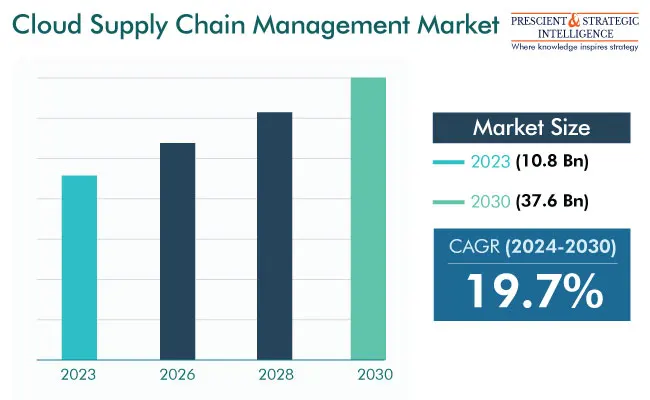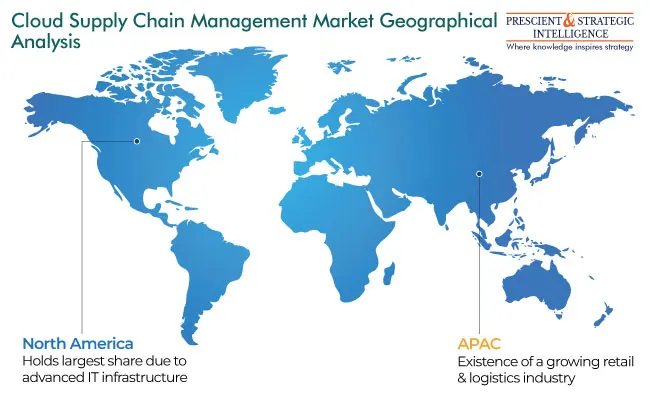Report Code: 10833 | Available Format: PDF
Cloud Supply Chain Management Market Report - Global Size, Share, Developments, Segmentation Analysis, and Forecasts, 2024-2030
- Report Code: 10833
- Available Format: PDF
- Report Description
- Table of Contents
- Request Free Sample
Cloud Supply Chain Management Market Overview
The global cloud supply chain management (SCM) market was USD 10.8 billion (E) in 2023, which will increase to USD 37.6 billion (E) in 2030, advancing at a CAGR of 19.7% between 2024 and 2030.
The rising acceptance of cloud technologies, the surging need for agility & flexibility, increasing e-commerce & omnichannel retailing, and demand for data-driven decision-making are driving the industry growth.
- According to an article, in 2023, 94% of all businesses all over the world utilize some type of cloud computing service, which is an increase of 14% from 2020, that assists them in running their operations.

Drivers
- Rising acceptance of cloud technologies: The acceptance of cloud is increasing across different sectors, and cloud SCM is no exception. Companies are attracted to the advantages of cloud-based solutions, including decreased IT burden and enhanced security.
- For instance, the global demand for cloud computing services was around USD 622.6 billion in 2023, and it will increase to USD 1,880.2 billion in 2030.
- As per AWS, shifting from on-premises to cloud can result in a 20% decrease in total technology infrastructure spending as well as a decrease of 45% in security-associated incidents.
- Increasing e-commerce & omnichannel retailing: The development of e-commerce & omnichannel retailing is boosting the requirement for more integrated and efficient supply chains. Cloud SCM solutions can assist companies in managing complex order fulfillment procedures and deliver a seamless consumer experience.
- For example, the total value of the retail cloud industry will reach a value of $171.6 billion by 2030.
- Surging need for agility & flexibility: Companies must adapt swiftly to shifting market situations as well as consumer requirements. Cloud SCM solutions provide on-demand access and scalability, allowing companies to respond more efficiently.
- Demand for data-driven decision-making: Cloud SCM solutions offer access to real-time data as well as analytics, enabling companies to make data-driven, proper decisions regarding their supply chains.
- According to a recent survey, 95% of executives of big companies report a data-driven culture.
Trend
- Hybrid Cloud Acceptance
- Arrival of ML and AI
- Augmented Emphasis on Visibility & Collaboration
- Rising Importance of Cybersecurity
Hybrid cloud acceptance has appeared as a tactical option for several businesses, flawlessly incorporating on-premise solutions with the flexibility of public cloud infrastructure. This method improves data security & control, enabling businesses to keep a balance between privacy and scalability. At the same time, the advent of ML and AI has transformed supply chain management. Task automation, logistics optimization, and predictive demand analysis via ML and AI technologies result in improved effectiveness and significant reductions in expenses.
- For example, Maersk, a major shipping business, utilizes AI to enhance its container shipping procedures.
Moreover, there is also an increased focus on visibility as well as collaboration within supply chain operations. Cloud platforms enable real-time tracking of goods, allowing enhanced communication among partners and delivering greater visibility across the total supply chain. This improved transparency results in greater decision-making as well as efficient operations. Additionally, with the rising acceptance of cloud platforms, businesses now face more data security as well as privacy concerns. This has boosted the requirement for strong cybersecurity solutions, as businesses attempt to protect their sensitive data.
- According to a report, global cybercrime costs will reach USD 10.5 trillion yearly in 2025, which is an increase of 15% per year over the next 3 years.
- The global demand for cyber security will reach a value of USD 352.5 billion by the end of this decade.
- Moreover, as per a survey, in 2023, the average count of supply chain breaches is 4.16, which is an increase from 3.29 in 2022.
Challenges
- Shortage of skilled workers: Employing and handling cloud SCM solutions needs expert skills. There is a lack of trained workers in this sector, which can be a major challenge for several businesses.
- As per a recent survey, 64% professionals of in the supply chain stated a shortage of talent in their organizations. Moreover, talent shortage was found more serious in areas including logistics and transportation.
- Incorporation with existing systems: Incorporating cloud SCM solutions with present on-premises systems can be complicated as well as time-consuming. This can be a challenge in accepting this solution for some businesses.
Hybrid Category Is Major Contributor
The hybrid category, on the basis of deployment type, is a major contributor to the industry. Businesses progressively identify the value of joining on-premise infrastructure with the scalability and flexibility provided by public cloud solutions. This hybrid method enables a unified incorporation of data security as well as control, enhancing SCM procedures. As businesses look for a balance between privacy and operational effectiveness, the hybrid cloud arises as an important force shaping the landscape of cloud SCM. For instance, according to a survey published in 2022, 82% of respondents of the survey (IT leaders) reported that they have utilized the hybrid cloud.
| Report Attribute | Details |
Market Size in 2023 |
USD 10.8 Billion (E) |
Revenue Forecast in 2030 |
USD 37.6 Billion (E) |
Growth Rate |
19.7% CAGR |
Historical Years |
2017-2023 |
Forecast Years |
2024-2030 |
Report Scope |
Market Trends, Drivers, and Restraints; Revenue Estimation and Forecast; Segmentation Analysis; Impact of COVID-19; Companies’ Strategic Developments; Market Share Analysis of Key Players; Company Profiling |
Explore more about this report - Request free sample
Retail & E-Commerce Will Advance Significantly
The retail & e-commerce category will advance significantly in the year to come. This can be because most major players accept cloud-based technologies to enhance their supply chains with greater visibility as well as data insights. Technology incorporations are focused on understanding the consumer journey and offering a substantial enhancement.
- As per a recent study, businesses that efficiently use demand forecasting observe an average rise of 20% in forecast accuracy, resulting in a 15% decrease in inventory expenses and an increase of 10% in consumer satisfaction.
Reducing in-store sales & margins, increasing labor costs, and a sluggish economy, are all affecting the retail sector. Businesses, in order to remain competitive, necessitate tools that allow them to manage paper documents, along with unstructured or structured data more efficiently. Such factors will further boost the growth of this category in the years to come.
North America Is Dominating Market
North America accounts for the largest share of the industry. In the U.S., consumers benefit from various transportation means accessible in their progressively connected environment. Logistics businesses offer services such as SCM software, material handling, packaging, warehousing, returned goods management, brokerage, and forwarding. Moreover, North America will observe significant industry expansion, mainly because of the acceptance of GS1 standards, or Global Standards 1. This standard is intended to enhance the efficiency, visibility, and safety of supply chains across digital and physical channels.
Major healthcare providers or suppliers in this continent are collaborating with technology providers to enhance the agility of their supply chain abilities by employing cloud services for quicker responses through quicker lead times and enhancing service with less total expenses. Additionally, with the changing workload of the cloud environment, coupled with the increasing requirement for improved infrastructure management, the regional industry will continue to grow in the coming years.

- As per a recent survey, around 70% of all hospitals as well as health systems in the U.S. are expected to have accepted a cloud-based method to supply chain management by 2026.
Competitive Landscape
The cloud supply chain management (SCM) market is highly competitive because of its fragmented structure. The situation is ascribed to the existence of many recognized players such as software developers and integrators. Moreover, the continuous advancement of the industry further boosts the intensity of competition.
- In November 2023: Accenture declared that the company will collaborate with SAP SE to assist businesses in transforming their supply chains with an inclusive supply chain nerve center that can decrease risk, improve visibility, and assist sustainability aims. Moreover, the two companies plan to co-develop innovative abilities for the SAP IBP solution to assist in further improving an organization’s capability to rapidly & cost-effectively respond to shifts in demand, inventory, or supply.
- In November 2023 – Blue Yonder, a major provider of supply chain solutions, acquired Doddle, a major technology business specialized in making the first and last mile more profitable, seamless, and sustainable. Blue Yonder, with this acquisition, provides a more inclusive logistics suite intended to make more sustainable as well as profitable end-to-end supply chains.
Major players in the Industry Include:
- SAP SE
- Oracle Corporation
- Amazon.com Inc.
- Koch Industries Inc.
- Alphabet Inc.
- Descartes Systems Group Inc.
- Manhattan Associates Inc.
- Blue Yonder Group Inc.
- American Software Inc.
- IBM Corporation.
- Kinaxis Inc.
- HighJump Software Inc.
Want a report tailored exactly to your business strategy?
Request CustomizationWant an insight-rich discussion with the report author?
Speak to AnalystOur dedication to providing the most-accurate market information has earned us verification by Dun & Bradstreet (D&B). We strive for quality checking of the highest level to enable data-driven decision making for you
Our insights into the minutest levels of the markets, including the latest trends and competitive landscape, give you all the answers you need to take your business to new heights
With 24/7 research support, we ensure that the wheels of your business never stop turning. Don’t let time stand in your way. Get all your queries answered with a simple phone call or email, as and when required
We take a cautious approach to protecting your personal and confidential information. Trust is the strongest bond that connects us and our clients, and trust we build by complying with all international and domestic data protection and privacy laws